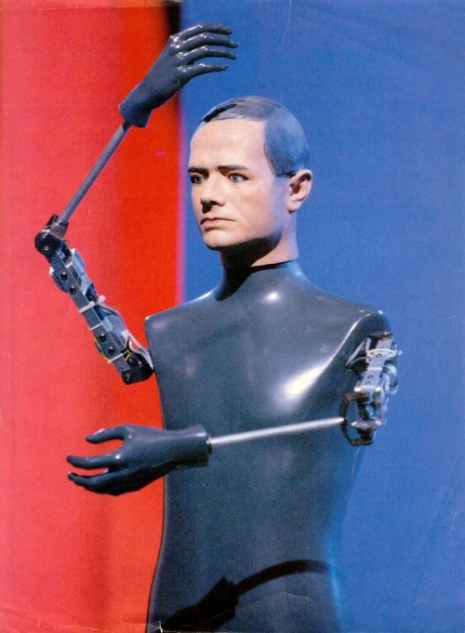
This documentary appeared on the Austrian TV station ORF in 1981, pretty clearly to coincide with the release of Computer World.
The special mixes Kraftwerk performing in front of an audience, what we would today call “music videos” that use some excellent documentary footage of missile launches and things like that, and footage of Ralf Hütter being interviewed by someone off-camera.
In pure technological mode, Ralf emphasizes the isolation of working so hard on Kraftwerk material in the studio for years on the new album, and is prompted to say a few things about the future of technology, most of which are a bit silly. The interviewer has an Austrian accent.
I’ve supplied a translation below. It’s rough but should give an accurate impression of what was said. I unfortunately couldn’t quite make out the intriguing final question, which has something to do with Kraftwerk entering people’s bloodstreams(?) or something like that. If there are any native German speakers out there reading this, I’d love it if you would chime in below and clarify what he was saying there (or make any other suggestions to the translation).
Ralf: “We are playing the entire Kling Klang Studio in concert. We have all of our instruments, some of which we invented ourselves and built music machines. You can’t just go into a shop and just say, “this thing or that thing.” We had to make it ourselves, and that took a long time. We construct them always ourselves, with the help of another friend, who is a sound engineer or a music engineer, he helps us and we make the whole thing ourselves. It took three years before we were able to play again. In part it is pre-programmed, but on the other hand we have access to the memory of the computer, and we can change it while it’s running. Mostly we make rhythmic programs or also melodic things that run throughout, automated.
Ralf: We feel, for example, lots of streams of energy, that come back to us from people. We are always in the studio, so are concentrating on ourselves more.
Question: Is “Radio-Aktivitat” actually an atomic-power song?
Ralf: Yes, you could definitely say that.Ralf: Yes, for us it was more a problem of how to make music at all in the Federal Republic of Germany, or so, after the war, where the living music, everyday music had disappeared, had been extinguished. And our generation had to start from scratch, to live somehow in this purely quiet situation, to make music not so much from natural things in the countryside but were influenced more by cities and machines, and reflected those things, and maybe some time passed, the time of so-called pop music, where we had more free time, we took up certain things, more about work processes and big-city situations, display windows and robots.
Question: Is that a form of interpretation, that showroom dummies speak?
Ralf: It’s a part of our existence. We stand around and we put ourselves on display. We are showroom dummies. That is a part of our reality.Question: How do you see yourselves when you are at work, as musicians or as technicians?
Ralf: We are music workers. We call ourselves music workers.Ralf: For ten years we’ve been working together, with this group in Düsseldorf, and outsiders can’t even work with us or speak our language — let’s say, our thoughts, they can’t implement our world of thoughts. So it’s more like an encounter or friendship.
Question: Do you feel yourselves to be somewhat isolated?
Ralf: Yes, we are exiles in Düsseldorf on the Rhine.Question: You don’t see any danger for people in technology?
Ralf: Sure, but I think it’s more like … like for example, computers as a mirror of our thoughts and the person who programmed—if he has just paranoid delusions in his head and persecution things happen, then the only thing he will be able to program are these persecution things.Question: [didn’t get it.]
Ralf: Don’t know. Man already has micro-streams, when you do an EKG, you see that it’s not separated at all, that’s not somehow separated from people or so. That’s a contradiction in terms, nature and technology, those things go together, we see them as unified, somehow.

Tracklist:
Nummern
Computer Welt
Taschenrechner
Die Stimme Der Energie
Radio-Activity
Schaufensterpuppen
Die Roboter
Trans-Europa Express
Europa Endlos
Heimcomputer
Previously on Dangerous Minds:
‘We are the Robots’: German elementary school kids do Kraftwerk
Ralf Hütter reviews Kraftwerk’s albums, 2009